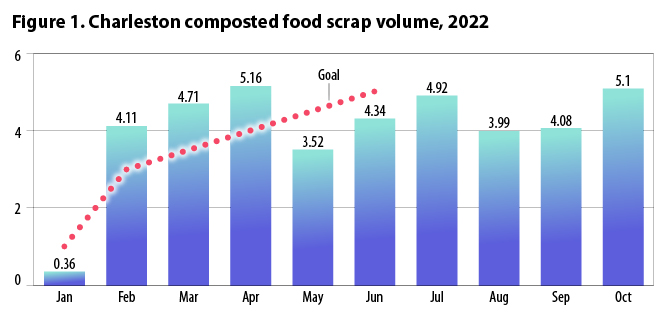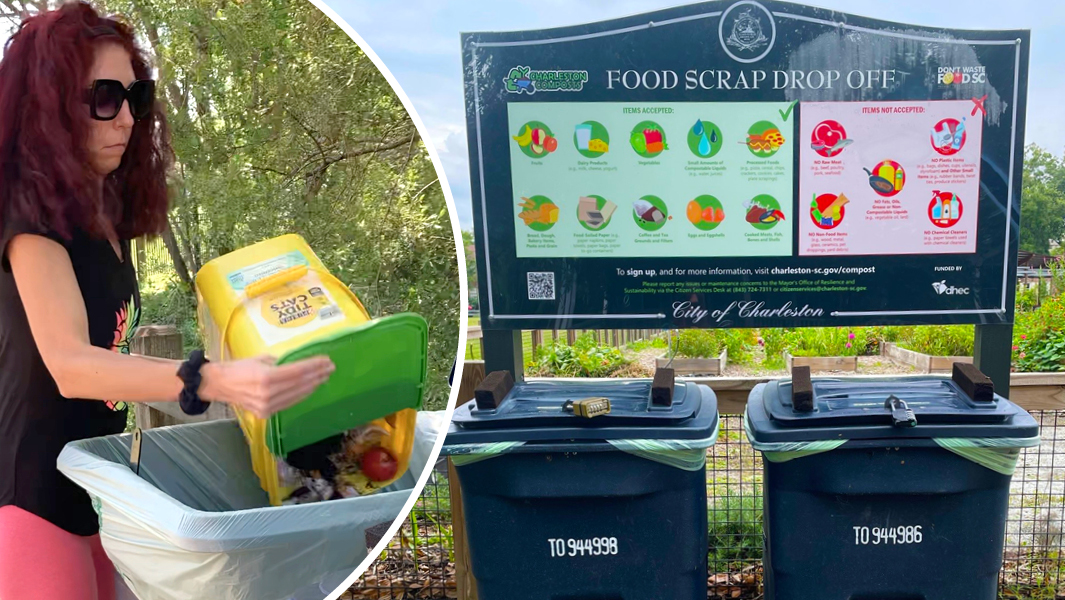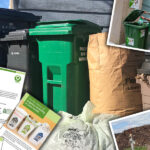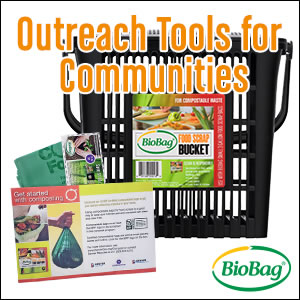Top: Residents have access to three food scraps drop-off sites within the city limits. Photos courtesy of City of Charleston
The City of Charleston, South Carolina launched a residential food scraps drop-off pilot in January 2022 with grant funding from the South Carolina Department of Health and Environmental Control (DHEC). The grant, which enabled the city to test the logistics at three initial sites, covered drop-off site infrastructure (carts, signage, etc.), counter top bins to give to residents, food scraps hauling, and marketing and outreach materials. “We intended to kick-off the program in person and give away kitchen countertop bins at the event, but due to COVID, we pivoted to a webinar that 200 people attended and coordinated a separate time participants could pick up their countertop bins,” notes Katie McKain, Charleston’s Director of Sustainability. “An in-person event was held in early March, where we gave away countertop and backyard bins, and trained residents on how to participate. The pilot was originally intended to be six months, but we extended it through the end of 2022. Due to the program’s success, we have a request in the City’s 2023 budget to fund the drop-off sites as a full-service permanent program, which includes adding new drop sites. The city is naturally divided into regions and the goal is to have a drop-off location in each one.”
 Households in Charleston generate about 15,000 tons/year of food scraps, the majority of which are landfilled. The city’s initial goal for household sign-ups was about 500. “We hit that right away, and are up to about 1,000 households now,” adds McKain. “And our goal for food scraps diverted away from the landfill was 20 tons in the 6-month period, and the households participating surpassed that [Figure 1].” Accepted materials include all food scraps, soiled paper, BPI-certified compostable liner bags, and plates and carryout containers from restaurants. Charleston has year-round curbside yard trimmings collection, so that material cannot be brought to the drop-off sites. Collected food scraps are taken to Charleston County’s Bees Ferry composting site, which is operated by McGill Compost.
Households in Charleston generate about 15,000 tons/year of food scraps, the majority of which are landfilled. The city’s initial goal for household sign-ups was about 500. “We hit that right away, and are up to about 1,000 households now,” adds McKain. “And our goal for food scraps diverted away from the landfill was 20 tons in the 6-month period, and the households participating surpassed that [Figure 1].” Accepted materials include all food scraps, soiled paper, BPI-certified compostable liner bags, and plates and carryout containers from restaurants. Charleston has year-round curbside yard trimmings collection, so that material cannot be brought to the drop-off sites. Collected food scraps are taken to Charleston County’s Bees Ferry composting site, which is operated by McGill Compost.
The cost for the drop-off program is less than $1/household/month and considerable savings in garbage collection expenses are on the horizon for taxpayers since over 25% of the garbage collected is food scraps. “The community has expressed its support for expanding the program to elected officials,” says McKain. “The number one request from our surveys is to add more drop sites.”
Interest in household food scraps drop-off is also growing in other jurisdictions. On October 1, the City’s program became regional when partners joined the effort. Charleston County opened a site at its Bees Ferry Convenience Center and the town of Folly Beach set one up at its Community Center. “Now is a great time to scale up the program and invite partners to join,” she adds. “If we leverage each other’s resources and work together in a community-wide approach, we can reach more people and have a bigger impact.”













